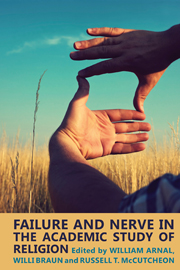Book contents
- Frontmatter
- Content
- Preface
- Acknowledgments
- Contributors
- Epigraph
- The Nerve of Donald Wiebe
- The Failure of Nerve in the Academic Study of Religion
- General Failures
- Catching Up with Marx: Truth, Myth, and the Niceties of “Belief”
- Fixed Geomorphologies and the Shifting Sands of Time
- A Critical History of Religion as a Psychological Phenomenon
- Everything Old Is New Again
- Revisiting the Confessional: Donald Wiebe's “Small ‘c’ Confessional,” Its Historical Entailments and Linguistic Entanglements
- Special Failures
- In Lieu of Conclusion
- Index of Authors
Everything Old Is New Again
from General Failures
- Frontmatter
- Content
- Preface
- Acknowledgments
- Contributors
- Epigraph
- The Nerve of Donald Wiebe
- The Failure of Nerve in the Academic Study of Religion
- General Failures
- Catching Up with Marx: Truth, Myth, and the Niceties of “Belief”
- Fixed Geomorphologies and the Shifting Sands of Time
- A Critical History of Religion as a Psychological Phenomenon
- Everything Old Is New Again
- Revisiting the Confessional: Donald Wiebe's “Small ‘c’ Confessional,” Its Historical Entailments and Linguistic Entanglements
- Special Failures
- In Lieu of Conclusion
- Index of Authors
Summary
Preamble
Almost thirty years ago Don Wiebe published the hard-hitting essay that opens this volume. It is therefore more than just lamentable that today, preparing a chapter for a book that further documents the problems that he first identified a generation ago, it is rather easy to find a site within the academic study of religion where scholars continue to illustrate their failures of critical intelligence. For example, looking no further than a recent issue of the flagship journal for the study of religion in North America, Journal of the American Academy of Religion, readers find an essay where it is argued that scholars of religion can be “critical caretakers” in pursuing “constructive engagement” intended to bring about peace and justice (Omer 2011). Borrowing from my own work the opposed terms critic and caretaker— terms that I had earlier taken as a gift from Burton Mack (Mack 2001; McCutcheon 2001)—the author proposes a synthesis (or in keeping with her article's theme, a hybridization) that transcends the dichotomy, arguing that
[t]he problem with McCutcheon's approach is that it blocks the possibility of thinking constructively about alternative modes of socializing that both redress past injustices and ask how religion and theology…may fit into the refashioning of national boundaries… Hence, McCutcheon's critical approach is insufficient for thinking about transforming conflicts and underlying structures of injustice.
(Omer 2011: 460)As I see it, the problem here is not that my work “blocks the possibility of thinking constructively”.
- Type
- Chapter
- Information
- Failure and Nerve in the Academic Study of Religion , pp. 78 - 94Publisher: Acumen PublishingPrint publication year: 2012

